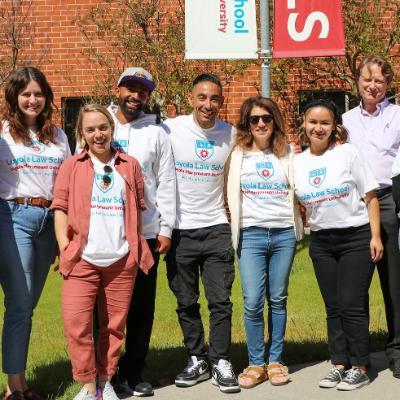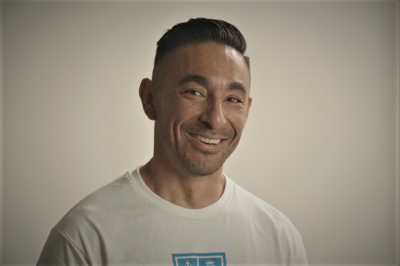Louie B: Sentenced to LWOP; resentenced under Miller in 2016, released on parole in 2020

After a chaotic and dangerous childhood on the streets of Los Angeles, Louie B was convicted of a crime in 1997, when he was 16. Even though he was only a teenager, the court sentenced him to life without the possibility of parole. At the time, he fully expected to die in prison.
Hope arrived in the form of the U.S. Supreme Court’s decision in Miller v. Alabama, argued by Bryan Stevenson (Just Mercy) in 2012. But as Stevenson himself said, “This opinion means nothing if we can’t put it into practice.”
Starting in 2012, the Juvenile Innocence & Fair Sentencing (JIFS) Clinic put Stevenson’s vision into practice. A small army of law students, staff attorneys and social workers from Loyola Law School, led by clinic director Professor Chris Hawthorne (’00) litigated the first Miller cases in California – and among them was Louie.
In 2016, three JIFS students – Seth Hancock (’16), Tara Khani (’17), and Marisa Harris (’17) – represented Louie in Norwalk Superior Court. After months of litigation, the team was successful, and Louie was resentenced to a parole-eligible sentence. At the time, it was unprecedented for law students to litigate high-stakes sentencing cases in LA Superior Court.
It is not unprecedented anymore. Since then, law students in the JIFS Clinic have achieved over 100 significant victories for clients in front of trial courts, appellate courts, the Supreme Court, and the Board of Parole Hearings. Louie is one of more than 50 clients who have been released and are living successful lives. Not one JIFS client has reoffended following release.
One key to the team’s victory was Louie’s statement of remorse and rehabilitation to the court. Consistent with the JIFS Clinic’s commitment to holistic sentencing, students worked with Louie to make the painful and difficult journey to responsibility and insight. Louie read his statement aloud to a rapt and silent courtroom. The judge said that it was Louie’s heartfelt words to the court that ultimately convinced her to resentence him.
The JIFS Clinic did not stop there. Two years later, in 2019, Melissa Padilla-Lemus (’20) and Marisa Harris (now a supervising attorney for JIFS) represented Louie at his first parole hearing. The Board ordered him released - and on April 10, 2020, surrounded by JIFS students and staff, he walked out of Lancaster State Prison, a free man.
The JIFS Clinic continues to support Louie as he navigates life on the outside and cares for his aging mother. He is now living in his own apartment, working a full-time job at a film production company, and finishing his college degree at Cal State LA. Louie validates the central tenet of JIFS and the juvenile resentencing movement: You are so much more than the worst thing you have ever done in your life.
“The JIFS Clinic … they gave me my freedom.” -Louie B.
Listen from Louie himself
When you contribute to the JIFS Clinic, you do not just fund the work that redresses unfair sentencing of youth and puts clients on the path to a successful, law-abiding life. You are also helping to train the next generation of advocates in the most effective way: by sending them to court to represent clients. And it works! JIFS students are in public interest and public defender offices all over California and the US, bringing a new vision of holistic defense representation that has transformed the landscape of criminal justice.
Recently, the Los Angeles County DA’s Office recognized this truth, by designating the JIFS Clinic as a partner to their newly formed Resentencing Unit. Now JIFS students work side-by-side with progressive prosecutors to identify and seek release for people who were over-sentenced as juveniles and demonstrate the insight and readiness for release that is a hallmark of JIFS clients.
